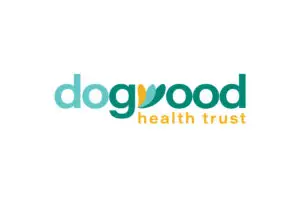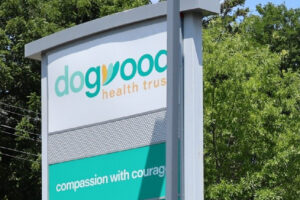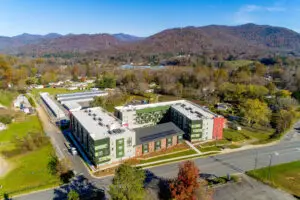Grant funding will support purchase of Days Inn Tunnel Road Asheville location for permanent supportive housing for 85 formerly homeless individuals
Asheville, N.C. – Dogwood Health Trust announced today its support for Homeward Bound’s Home is Key project, a Housing First effort that will purchase and renovate the Days Inn on Tunnel Road in Asheville to create permanent supportive housing. Homeward Bound plans to close on the Days Inn property in Asheville this summer, and intends to completely renovate the hotel and create permanent supportive housing for 85 formerly homeless individuals. Dogwood Health Trust is providing a $2 million leadership grant in support of the $13.5 million project.
In addition to providing housing for 85 of the community’s most chronically homeless and vulnerable, Home is Key will provide on-site case management, 24/7 staffing, on-site security and support services – all helping to create a successful adjustment to living indoors and off the street.
The project is founded on the Housing First model which embraces the principle that permanent housing is the foundation from which people must start rebuilding their lives. Until a person experiencing homelessness has a safe, secure place to live, he or she cannot move forward with addressing other struggles like mental illness, substance use disorders or chronic illness.
Homeward Bound’s Executive Director Meredith Switzer emphasizes that housing availability must be a top priority in our community, “Housing is healthcare and there has never been a public health crisis – at least not in my lifetime – that has accentuated this more than COVID-19. At the onset of the pandemic, we quickly realized that individuals who were most vulnerable to contracting the virus were those who were unhoused and unable to safely shelter in place. Housing First recognizes that housing is vital to an effective healthcare model.”
“Housing is a key pillar of overall health and wellbeing, and therefore one of Dogwood’s four Strategic Priorities,” added Susan Mims, MD, MPH, Interim Chief Executive Officer of Dogwood Health Trust. “We also focus on Education, Economic Opportunity, and Health & Wellness, but without a safe and stable place to live and a permanent address, it’s much harder to attend school consistently, to secure a decent job, or to gain access to regular medical care or other supportive services. Homeward Bound understands this and is creating a great benefit for our community.”
Across the country, the evidence for Housing First and permanent supportive housing is strong for being the most effective means of ending homelessness. Studies have shown it decreases interaction with police and the justice system, increases access to health and behavioral health services through proper channels, improves people’s quality of life and costs the community about one-third less than people living on the streets and in shelters.
“Because there is no one size fits all approach to addressing affordable housing, Dogwood works along a continuum, and always through an equity lens,” said Sarah Grymes, Dogwood’s Vice President of Impact for Housing. “That continuum includes homelessness, shelters, transitional housing, permanent supportive housing, affordable rental housing and affordable home ownership. At any point along the way, we have an opportunity to not only step in and help, but work with our partners to create truly transformational outcomes. The Home is Key project is one of those opportunities to create a significant impact in the lives of many, and we’re honored to be able to provide this support.”
All residents will have incomes from zero to 30% of the area median income (AMI). Each resident will receive individualized, supportive services focused on housing stabilization and improving quality of life. Core services include on-site case management and 24/7 support staff to quickly respond to resident needs and assure a safe environment for residents and guests. Additional services in partnership with community agencies may include behavioral health services, social and educational activities, food service, job training, and a medical clinic. Each resident will have an individualized case management plan to enhance both housing stability and independence.
Since 1987, Homeward Bound has been a leader in addressing the issue of homelessness. Their current top priority is to house individuals who are chronically homeless, who have been living on the streets for many years and struggle with mental illness, substance use disorders, chronic health conditions, and have a history of interaction with public safety and hospital and healthcare systems. This medically fragile population is the hardest to keep in housing, imposes high cost to the community because of overuse of public services, and faces the daily risk of death on the street if not provided supportive housing.
Switzer adds that the annual operating cost of housing 85 of these medically fragile individuals, along with supportive programming, is a little more than $1 million. Comparatively, the cost to the community for doing nothing for these 85 individuals ranges between $3 million and $4 million annually.
Homeward Bound has operated a similar project, The Woodfin Apartments, with great success. Having completed its fifith year, 90% of individuals living in this downtown Asheville location have remained housed. For additional information, visit https://homewardboundwnc.org/.
About Dogwood Health Trust Dogwood Health Trust is a private foundation based in Asheville, North Carolina with the sole purpose of dramatically improving the health and well-being of all people and communities of 18 counties and the Qualla Boundary in Western North Carolina. Dogwood Health Trust was created from the net proceeds of the sale of Mission Hospital System and focuses on innovative and equitable ways to address the many factors that contribute to overall health and wellness, with a focus on housing, education, economic opportunity, and access to care and health resources. Dogwood Health Trust works to create a Western North Carolina where every generation can live, learn, earn and thrive, with dignity and opportunity for all, no exceptions. To learn more, please visit www.dht.org.





